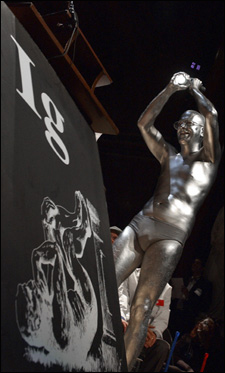Ig Nobel Prizes will skewer silly science at Sanders
This year’s awards ceremony set for Oct. 2

Nano-seminars, Murphy’s son’s law, an opera about a scientist who falls in love with an oxygen atom, and the ever-popular “Win-a-Date-With-a-Nobel-Laureate Contest,” will take center stage at Sanders Theatre Oct. 2 during the annual Ig Nobel Prize ceremony.
The Ig Nobels give the scientific community its annual belly laugh by turning the spotlight on itself. The ceremony annually honors actual achievements that may have looked good when they started, but which look eminently spoof-able in hindsight, and which, in the words of organizers, “cannot or should not be reproduced.”
Last year’s winners included the authors of the scientific report “Courtship Behaviors of Ostriches Towards Humans Under Farming Conditions in Britain”; the inventors of Bow-lingual, a dog-to-human translation device; and Enron, Worldcom, and 25 other companies for “adapting the mathematical concept of imaginary numbers for use in the business world.”
The Ig Nobel prize ceremony will be held Oct. 2 at 7:30 p.m. in Sanders Theatre. Tickets are available at the Harvard Box Office (617) 496-2222 in the Holyoke Center. The ceremony will be Webcast live at www.improbable.com and recorded for rebroadcast the day after Thanksgiving on NPR’s ‘Talk of the Nation/Science Friday’ program. The Ig Informal Lectures will be held at 1 p.m. on Oct. 4 at the Massachusetts Institute of Technology and are free.
The ceremony is sponsored by the science humor magazine Annals of Improbable Research and the Harvard student groups The Harvard Society of Physics Students, The Harvard Computer Society, and The Harvard-Radcliffe Science Fiction Association.
Each year, the Ig Nobels honor 10 winners, some of whom travel to Harvard to take their lumps – er, receive their prizes – in person. Waiting to greet this year’s winners are a stable of Nobel laureates, including Frank B. Baird Jr. Professor of Chemistry and 1986 laureate in chemistry Dudley Herschbach; Abbott and James Lawrence Professor of Chemistry Emeritus and 1976 laureate in chemistry William Lipscomb; 1993 laureate in physiology or medicine Richard Roberts; 2002 laureate in chemistry John Fenn; and 2001 laureate in physics Wolfgang Ketterle.
Other features of this year’s ceremony will be a keynote address by Edward A. Murphy III, the son of the Murphy of Murphy’s Law, an opera called “Atom and Eve,” and the nano-seminars, in which scientists explain complex subjects, first in 24 seconds and then in seven words.
Among this year’s four lecturers will be Gordon McKay Professor of Applied Physics and Professor of Physics Lene Hau, who won a MacArthur fellowship after becoming the first person to stop light and release it at will. Hau’s nano-seminar subject is “Slow Light.” Lipscomb will discuss the narrowly defined subject of “Chemistry,” Harvard senior Genevieve Reynolds will describe in detail “Education,” and Broad Institute head Eric Lander will use his time to flesh out details of “The Genome.”
Winners will stay in town to deliver the Ig Informal Lectures about their achievements on Oct. 4 at 1 p.m. at the Massachusetts Institute of Technology.




